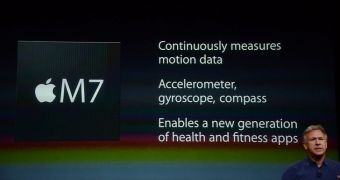Reddit user Glarznak reveals that the M7 motion co-processor inside the iPhone 5c works to track a user’s movements even after the phone’s battery dies. The news could spur a new wave of speculation that our iPhones track our actions even when we thought they didn’t.
Redditor Glarznak writes, “While traveling abroad, my iPhone cable stopped working so my 5s died completely. I frequently use Argus to track my steps (highly recommended if you have any health bands or accessories) since it takes advantage of the M7 chip built into the phone.”
He then drops the bombshell: “Once I got back from my vacation and charged the phone, I was surprised to see that Argus displayed a number of steps for the 4 days that my phone was dead. I’m both incredibly impressed and slightly terrified.”
While certainly interesting, the news could also send shockwaves through the slightly more paranoid user base who might have thought that a dead iPhone was just that – dead.
The iPhone 5s M7 chip is known to demand very little power, and it’s also common knowledge that when an iPhone turns itself off, there’s still some power left in the battery, such as for displaying the low-power/recharge prompt.
User LakeSolon explains this much in his reply on the respective topic: “This is an advertised feature,” he writes. “The M7 being a separate chip so this data can be managed without waking the CPU thus reducing battery consumption was described in the presentation which announced the 5S.”
“It was not explicit that it would continue to work after your phone refused to operate, but given that even when an iPhone won't power on it still displays the ‘out of battery’ image when you try: it's a perfectly reasonable expectation that low power features are still functioning. I'd bet it's even in the developer docs,” adds LakeSolon.
Indeed, the M7’s ability to track a user’s movements even after the device is turned off should be stated in Apple’s developer guides. A user who relies heavily on fitness solutions like the aforementioned Argus app might actually demand Apple to keep the data flowing to the M7 chip so he or she doesn’t miss a beat.
However, the company doesn't expressly state that the feature continues to work even after the phone dies.
Thus, the real question becomes “how can a user make sure the M7 completely stops tracking their movements, with or without turning off the phone?” Some people might actually feel insecure knowing that their phones continually track their every move without their consent.

 14 DAY TRIAL //
14 DAY TRIAL //